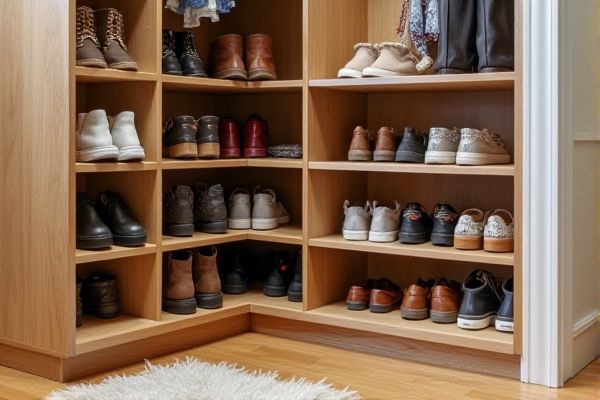
A rotating shoe rack maximizes storage in compact spaces by allowing easy access to multiple pairs with a simple turn, while a pull-out shoe rack offers straightforward visibility and organization by sliding out from a cabinet or closet. Discover which option best suits your space and style by reading the rest of the article.
Table of Comparison
| Feature | Rotating Shoe Rack | Pull-Out Shoe Rack |
|---|---|---|
| Design | 360-degree rotating carousel | Sliding shelves within a cabinet |
| Space Efficiency | Compact, ideal for corner spaces | Maximizes cabinet depth and width |
| Capacity | Moderate, depending on tiers | High, depending on cabinet size |
| Accessibility | Easy, rotate to reach any pair | Full view and reach by pulling out |
| Installation | Freestanding or built-in options | Requires cabinet or built-in mount |
| Cost | Usually affordable | Can be more expensive due to hardware |
| Durability | Depends on rotating mechanism | Sturdy, often with metal slides |
| Best For | Small spaces, quick access | Organized storage, large collections |
Introduction to Shoe Storage Solutions
Rotating shoe racks maximize vertical space by allowing easy access to multiple pairs within a compact footprint, making them ideal for small closets. Pull-out shoe racks slide out smoothly from cabinets or wardrobes, offering clear visibility and convenient organization for your shoe collection. Choosing between these solutions depends on your space constraints and how quickly you want to access your footwear.
What is a Rotating Shoe Rack?
A rotating shoe rack is a compact storage solution designed to maximize space by allowing shoes to spin around a central axis for easy access. Each tier typically holds multiple pairs, letting You quickly view and select footwear without needing to rearrange others. Compared to pull-out shoe racks, rotating versions save floor space and provide a 360-degree organization system ideal for closets with limited room.
What is a Pull-Out Shoe Rack?
A pull-out shoe rack is a space-saving storage solution designed to slide in and out of a cabinet or closet, providing easy access to your shoes without taking up extra room. Unlike rotating shoe racks that spin to display footwear, pull-out racks maximize vertical space and keep shoes neatly organized in rows. Your choice depends on the available space and how you prefer to store and access your shoe collection efficiently.
Space Efficiency Comparison
Rotating shoe racks optimize space by utilizing vertical storage and allowing easy access to multiple pairs of shoes in a compact footprint, making them ideal for small closets or entryways. Pull-out shoe racks maximize storage by sliding out from cabinets or under shelves, efficiently using deep and narrow spaces while keeping shoes neatly organized and hidden. Your choice depends on available space and convenience preferences, with rotating racks excelling in quick visibility and pull-out racks in maximizing concealed storage.
Accessibility and Convenience
Rotating shoe racks provide easy access to shoes by spinning the rack, allowing users to view and select footwear without bending or moving multiple pairs. Pull-out shoe racks maximize space efficiency by sliding out from cabinets or closets, enabling quick retrieval and organized storage. Both designs enhance accessibility, but rotating racks offer a 360-degree view while pull-out racks are ideal for narrow spaces.
Capacity and Organization
Rotating shoe racks maximize capacity by utilizing vertical space efficiently, allowing easy access to a large number of shoes without taking up extensive floor area. Pull-out shoe racks offer organized storage by sliding out to reveal multiple tiers, making it simple to view and select footwear while keeping shoes neatly arranged. Both options enhance organization, but rotating racks excel in compact spaces, whereas pull-out racks provide better visibility and separation of individual pairs.
Material and Design Options
Rotating shoe racks are often crafted from lightweight metals like aluminum or steel combined with plastic components, featuring a circular, space-saving design ideal for small closets. Pull-out shoe racks typically utilize hardwood, engineered wood, or metal frames with smooth gliding mechanisms, designed for installation within cabinetry to maximize shoe organization. Both types offer customizable designs, but rotating racks excel in vertical storage efficiency while pull-out racks provide easy access and integration with existing furniture.
Installation and Maintenance
Rotating shoe racks typically require fixed installation with mounting hardware, which ensures stability but can be more complex and time-consuming to set up, whereas pull-out shoe racks often fit into existing cabinet spaces and are relatively easier to install with slide mechanisms. Maintenance for rotating racks involves periodically lubricating bearings to ensure smooth rotation and cleaning the shelves to prevent dust buildup, while pull-out racks demand routine checks of sliding tracks for debris or damage to maintain effortless operation. You can choose between these options based on your preference for installation effort and ongoing maintenance needs.
Cost Considerations
Rotating shoe racks typically offer a compact design with moderate pricing, making them a cost-effective option for maximizing vertical storage in smaller spaces. Pull-out shoe racks, while often priced higher due to their sliding mechanism and custom cabinetry integration, provide easier access and better organization for larger shoe collections. Your choice depends on budget constraints and the value you place on accessibility versus space efficiency.
Which Shoe Rack is Right for You?
Rotating shoe racks maximize vertical space with multi-tiered, circular designs that provide quick access to numerous pairs in compact areas, perfect for small closets or entryways. Pull-out shoe racks offer organized, slide-out shelves that enhance visibility and ease of access, ideal for larger closets or wardrobes requiring efficient storage without sacrificing floor space. Choosing between the two depends on your available room dimensions, preferred access style, and the volume of shoes needing storage.
 homyna.com
homyna.com